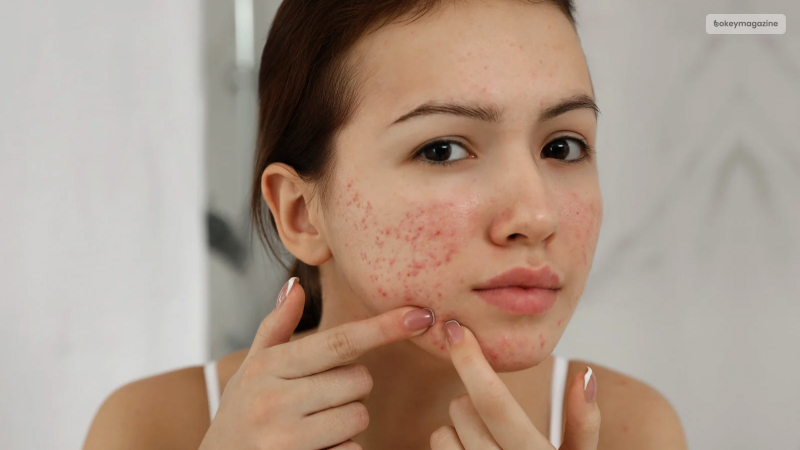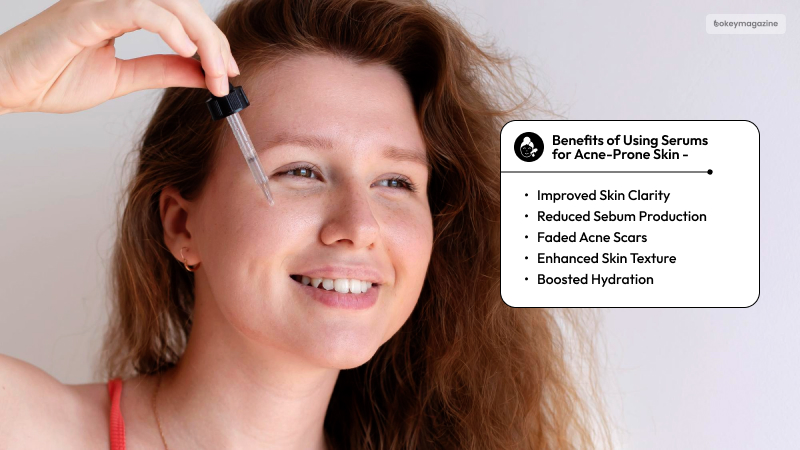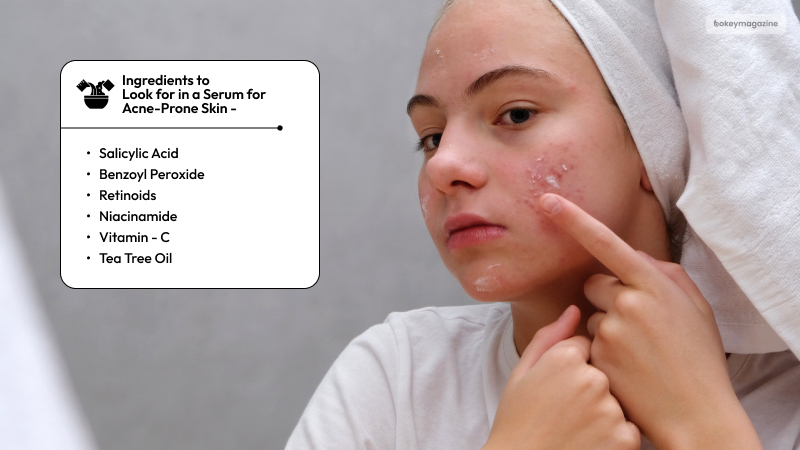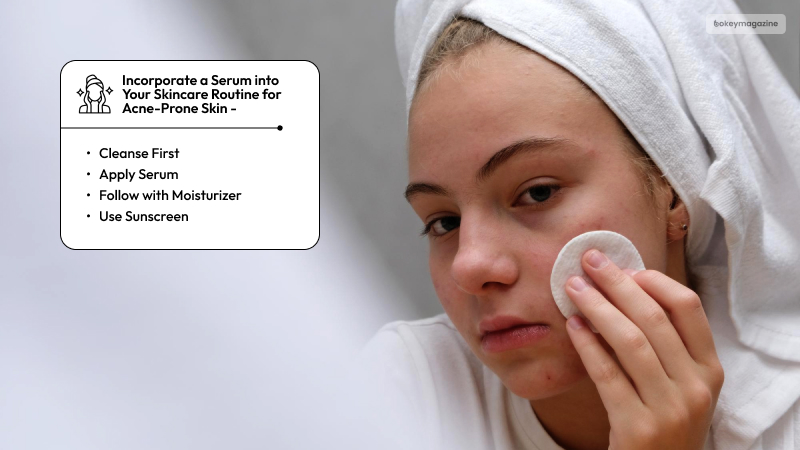
Is It Okay to Use Serum For Acne-Prone Skin?
As someone who has struggled with acne-prone skin for years, I know how frustrating it can be to find the right skincare products that work. Serums, in particular, can be a game-changer for those with stubborn blemishes and uneven skin tone.
But with so many options, it can be overwhelming to figure out which serum best fits our unique skin concerns. In this article, I will talk in detail about the science behind serums, their potential benefits, and the best serums for acne-prone skin.
Understanding Acne-Prone Skin and the Role of Serums
Acne-prone skin is characterized by an overproduction of oil, clogged pores, and the development of blemishes like blackheads, whiteheads, and inflamed pimples. This can be caused by a variety of factors, including hormonal imbalances, genetics, stress, and the use of certain medications or skincare products.
Serums, in particular, can help a lot in managing acne-prone skin. They are concentrated, potent skincare formulas that are designed to target specific skin concerns like acne. Consequently, the right serum can help regulate oil production, unclog pores, and reduce the appearance of blemishes. By incorporating a serum into your routine, you can address the root causes of your acne and achieve clearer, more radiant skin.
The Benefits of Using Serums for Acne-Prone Skin

Using a serum specifically formulated for acne-prone skin can provide a few benefits, including:
- Improved Skin Clarity: Serums with acne-fighting ingredients like salicylic acid, benzoyl peroxide, or retinoids can help unclog pores, reduce inflammation, and prevent future breakouts.
- Reduced Sebum Production: Serums with mattifying or oil-controlling properties can help regulate the skin’s natural oil production, keeping your complexion fresh and shine-free.
- Faded Acne Scars: Certain serums contain brightening and resurfacing ingredients that can help fade the appearance of post-inflammatory hyperpigmentation and acne scars.
- Enhanced Skin Texture: Serums with exfoliating properties can smooth out rough, uneven skin texture and reveal a more radiant, youthful-looking complexion.
- Boosted Hydration: Despite their targeted treatment, many serums for acne-prone skin also provide hydration, helping to maintain the skin’s natural moisture balance.
Factors to Consider When Choosing a Serum for Acne-Prone Skin
When selecting a serum for your acne-prone skin, there are several key factors to consider:
- Skin Type: Determine whether your skin is oily, dry, or a combination, as this will help you choose a serum with the appropriate level of hydration.
- Acne Severity: If you have mild to moderate acne, you may be able to use a serum with a lower concentration of active ingredients. For more severe breakouts, you may need a stronger formula.
- Ingredient Sensitivity: Be mindful of any ingredients that may cause irritation or sensitivity, such as fragrances, alcohol, or certain essential oils.
- Skin Concerns: Consider your specific skin concerns, such as enlarged pores, blackheads, or post-inflammatory hyperpigmentation, and look for a serum that addresses those issues.
- Formulation: Choose a serum with a lightweight, non-comedogenic (non-pore-clogging) formula that won’t feel heavy or greasy on the skin.
Ingredients to Look for in a Serum for Acne-Prone Skin

When it comes to serums for acne-prone skin, there are certain key ingredients you’ll want to look for:
- Salicylic Acid: This beta-hydroxy acid (BHA) is a powerful acne-fighting ingredient that can penetrate deep into the pores to unclog them and reduce inflammation.
- Benzoyl Peroxide: This potent antibacterial agent helps to kill the acne-causing bacteria that contribute to breakouts.
- Retinoids: Retinol and other retinoid compounds can help regulate cell turnover, unclog pores, and reduce the appearance of acne scars.
- Niacinamide: This vitamin B3 derivative has anti-inflammatory properties and can help control oil production and minimize the appearance of pores.
- Vitamin C: Ascorbic acid and other vitamin C derivatives can help brighten the skin, fade acne scars, and provide antioxidant protection.
- Tea Tree Oil: This natural, antibacterial essential oil can help reduce inflammation and kill acne-causing bacteria.
Best Serums for Acne-Prone Skin
Here are some of the best serums for acne-prone skin, along with a brief review of each:
- The Ordinary Salicylic Acid 2% Solution: This affordable, no-frills serum is a great option for those with mild to moderate acne. It contains 2% salicylic acid to unclog pores and reduce blemishes.
- Peter Thomas Roth Potent-C Targeted Spot Brightener: This serum combines 10% pure vitamin C with salicylic acid and retinol to tackle acne, hyperpigmentation, and uneven skin tone.
- The Inkey List Retinol Serum: A budget-friendly retinol serum that can help improve skin texture, reduce breakouts, and fade acne scars over time.
- Sunday Riley U.F.O. Ultra-Clarifying Face Oil: As you can see from the name, this is not a serum but a potent yet non-greasy medicated oil. It contains 1.5% salicylic acid, tea tree oil, and black cumin seed oil to combat acne and regulate oil production.
- SkinCeuticals Blemish + Age Defense: This serum combines 2% dioic acid, 0.3% salicylic acid, and 5% niacinamide to target both acne and signs of aging.
- Revision Skincare Retinol Complete: A gentle, time-release retinol formula that can help improve skin clarity and reduce the appearance of acne scars.
- La Roche-Posay Effaclar Duo [+] Acne Spot Treatment: This lightweight, non-comedogenic serum combines 5.5% benzoyl peroxide and 0.4% lipohydroxy acid to target active breakouts.
However, it’s always a good idea to consult with a dermatologist to get the best possible advice on finding the best serum for acne-prone skin.
How to Incorporate a Serum into Your Skincare Routine for Acne-Prone Skin

Incorporating a serum into your skincare routine for acne-prone skin is relatively straightforward, but there are a few key steps to keep in mind:
- Cleanse First: Always start with a thorough cleansing to remove any dirt, oil, or impurities from the skin’s surface.
- Apply Serum: After cleansing, apply a few drops of your chosen serum to the face, focusing on the areas that are more prone to breakouts.
- Follow with Moisturizer: Finish your routine by applying a non-comedogenic moisturizer to lock in the serum’s benefits and prevent your skin from drying out.
- Use Sunscreen: Don’t forget to apply a broad-spectrum sunscreen during the day, as many acne-fighting ingredients can increase sun sensitivity.
Last but not least, if you’re using a new serum with potent active ingredients, start by using it every other day and slowly work your way up to daily use to allow your skin to adjust.
How to Maximize the Effectiveness of a Serum for Acne-Prone Skin
To get the most out of your acne-fighting serum, consider these tips:
- Pair with Complementary Products: Combine your serum with other acne-targeted products, such as a salicylic acid-based cleanser or a clay mask, for a more comprehensive treatment.
- Adjust Usage Based on Skin Needs: If your skin feels overly dry or irritated, cut back on the frequency of use or mix the serum with a bit of moisturizer.
- Be Patient and Consistent: It can take several weeks to see noticeable results from a new serum, so stick with it and give your skin time to adjust.
- Exfoliate Regularly: Incorporate a gentle physical or chemical exfoliant into your routine to help unclog pores and enhance the serum’s effectiveness.
Common Mistakes to Avoid When Using a Serum for Acne-Prone Skin
While serums can be incredibly beneficial for acne-prone skin, there are a few common mistakes to steer clear of:
- Overusing Active Ingredients: Applying too much of a potent active ingredient, like salicylic acid or retinol, can lead to dryness, irritation, and even more breakouts.
- Skipping Moisturizer: Acne-prone skin still needs hydration, so don’t skip the moisturizer step, even if you’re using a mattifying serum.
- Neglecting Sun Protection: Many acne-fighting ingredients can increase sun sensitivity, so make sure to always follow up your serum with a broad-spectrum sunscreen.
- Switching Products Too Frequently: Giving your skin time to adjust to a new serum is key, so resist the urge to try a different one every few weeks.
- Ignoring Other Lifestyle Factors: While a great serum can make a big difference, don’t forget to address other potential contributors to your acne, such as diet, stress, and hormonal imbalances.
So, Is It Okay To Use Serum for Your Acne-Prone Skin
Serum can work wonders for your acne-prone skin but remember to consider your unique skin type and concerns. Henceforth, look for key acne-fighting ingredients, and be patient and consistent with your routine.
If you’re ready to take the next step in your journey to clear, radiant skin, I encourage you to consult with a dermatologist or skincare professional to get personalized recommendations for the best serum for acne-prone skin. With the right products and a little bit of TLC, you can achieve the complexion you’ve been dreaming of.
You May Also Like To Read:



















Post Your Comment